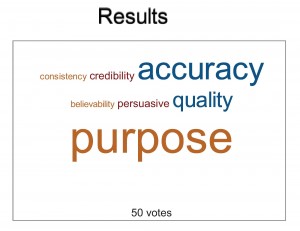Exploring Cultural Identity
To practice thinking and writing about the idea of a research question, which is required for the research paper, please choose to focus on either “What You Pawn I Will Redeem” by Sherman Alexie or “My Faith in Nonviolence” by Mohandas Gandhi and respond as a group to the following items about your selected text and post your response in a comment to this blog post:
- Which text are you responding to and who is in your group?
- An issue is more specific and more focused than a topic. Given the topic of exploring cultural identity, what specific issue(s) can you identify regarding cultural identity in this text?
- What specific evidence (language, details, ideas) from the text creates this issue?
- A research question, I would argue, is even more specific than an issue. Try to frame your response to item #2 above as a question that could generate further research.
Below is a photo of Sherman Alexie:

Alexie photo by Larry D. Moore – (CC) Larry D. Moore.


